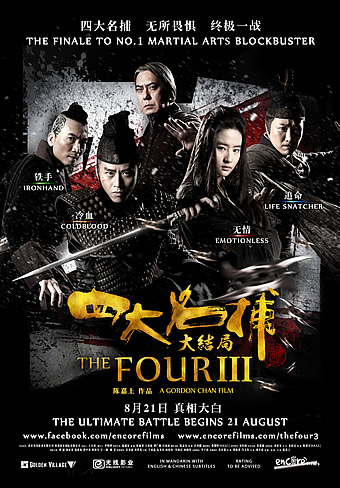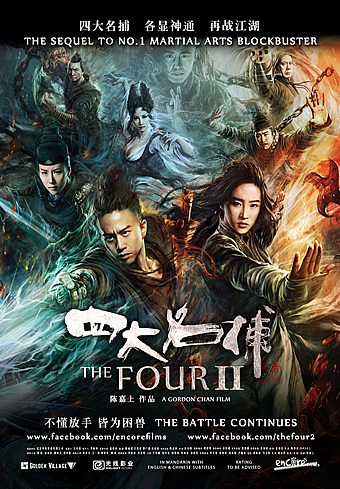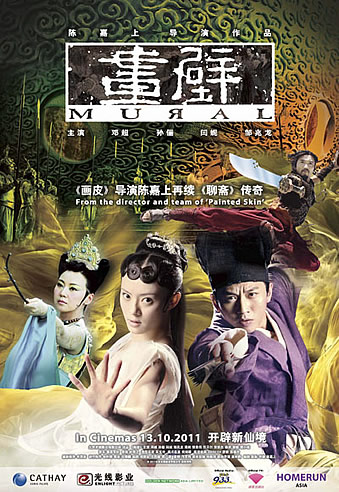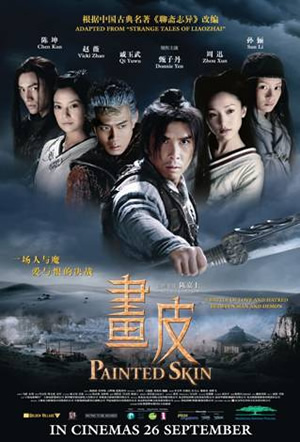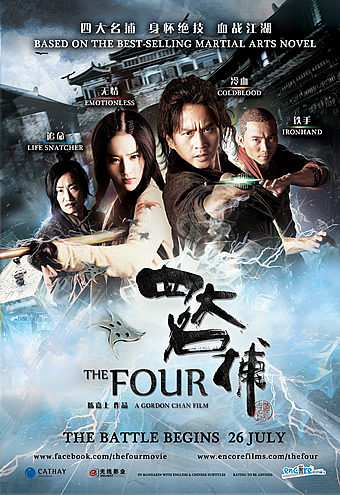THE FOUR 3 (四大名捕3) (2014)
Genre: Martial Arts/Action
Director: Gordon Chan
Cast: Liu Yifei, Deng Chao, Ronald Cheng, Collin Chou, Anthony Wong, Jiang Yiyan, Alec Su, Yu Chenghui
RunTime: 1 hr 47 mins
Rating: PG (Some Violence)
Released By: Encore Films & GV
Official Website:
Opening Day: 21 August 2014
Synopsis: The reputation of the Four constables survives, but since Emotionless's departure, there have been changes at the Divine Constabulary. The four rescue Zhuge Zhengwo from An Yun Shan's mountain fortress, then with the Emperor and Di armies, they attack. But An Yun Shan absorbs their power, which means the constables and their allies now face their most lethal opponent yet, a nearly invincible kung fu master who won't stop until he has absolute power...
Movie Review:
At this point in the trilogy, ‘The Four III’ will only make sense to those who have seen the first two chapters. Based on Chinese Malaysian author Woon Swee Oan’s bestselling novel series ‘The Four Great Constables’, the series was meant to be a game-changer in the Chinese movie industry with its genre-bending mix of action, drama, romance and fantasy. Yes, the eponymous four under the charge of Anthony Wong’s Zhuge Zhengwo formed the Divine Constabulary, so named because each one of them is blessed with superhuman powers.
For the benefit of the uninitiated, there is Cold Blood aka Leng Lingqi (Deng Chao), a former spy from a rival crime-fighting department known as Department Six previously sent to infiltrate the Constabulary and learn their secrets who has the gift (or curse) of transforming into a beast when provoked. He is in love with Emotionless (Crystal Liu Yifei), a psychic in a wheelchair who immediately recalls Professor X. Looking after Emotionless like an older brother is Iron Hands (Collin Chou), whose power is apparent from his name. And last but not least, there is Life Stealer (Ronald Cheng), better known for being a fast talker and a wine lover than for any particular standout ability.
There is a whole lot of backstory in ‘The Four II’ which proves critical to understanding the narrative developments here. Emotionless has learnt the truth behind her family’s assassination as a child, which precipitates her disillusionment with Zhuge Zhengwo and Iron Hands, as well as to a certain extent Cold Blood. On the other hand, Cold Blood is caught in a love triangle with newly installed Department Six head Ji Yaohua (Jiang Yiyan), who is doing the bidding for a certain powerful Lord An (Yu Chenghui). Lord An wants revenge for his son An Shigeng (Yu Chenghui), the baddie from the first movie who is now grafted onto a tree for life. Oh, there is also a shapeshifter named Ruyan (Ada Yan) also doing Lord An’s deeds, who sets in motion the chain of events in this third movie.
If all that read like a head-scratcher, you’re not alone. Even those who have seen the second movie will probably need a refresher to call to mind all the convolutions that made up the scatter-haired plot, and which director Gordon Chan offers no abbreviation at the start of this final instalment. Instead, he and co-director Janet Chun plunge right into things, beginning with Ruyan’s escape from prison which leads to a failed assassination of the Emperor (Alec Su) when he decides one day to come down from his throne and visit the city unannounced in order to get a better sense of his countrymen’s woes. The Emperor survives, but is captured by Emotionless before he can get to the loyal Zhuge Zhengwo, and it should be no secret that the turn of events afford Emotionless the redemption she needs from her emotional baggage.
As loyalties are tested and traitors exposed, the relatively swift-paced conclusion builds towards an epic finale where the Department Six and Divine Constabulary join forces against the common enemy Lord An. It’s a pompous special effects laden climax all right, where not only does each character get a chance to show off his or her skill but to work together as a team to defeat their most formidable enemy yet. We won’t spoil the ending for you, but suffice to say that some will find the denouement – though logical – somewhat of a letdown, with Zhuge Zhengwo playing a crucial last-minute role to Lord An’s annihilation.
Even though it is the best of the three, it is unlikely that ‘The Four III’ will satisfy anyone who has not caught the earlier two movies. If the middle section plays like melodrama, that’s because Chan has the unenviable task of bringing closure to the myriad story threads that were left unresolved in the preceding chapter. And yet while it does manage to tie all the loose ends nicely, the intended poignancy of Emotionless’ struggle between forgiveness and revenge as well as the romantic stirrings between her and Cold Blood will likely be lost on those who are encountering these characters for the first time.
But for those who have followed them from first to third, Chan’s ensemble cast rewards your loyalty with their best performances yet. Deng finally settles into a more grounded character here, and he shares good chemistry with Liu, who in turn acquits herself well in her most emotive turn yet. Cheng brings some levity to the proceedings, while Chou is still sadly underutilised. It is always a joy to see veteran actor Wong on screen, who brings both dignity and gravitas to his supporting act as Zhuge Zhengwo – in particular, he shares a nice intimate scene with Liu and TVB actress Sheren Tang who has an extended cameo as Emotionless’ guardian.
So despite the misgivings about ‘The Four’, this final instalment still manages to cap the trilogy at a high. In terms of storytelling, it is easily the most fluid, and in character development, the least clunky among the three. Those looking for some grand blockbuster action will still however be disappointed, as Ku Huen-chiu’s choreography still leaves much to be desired amid the slightly improved CGI. Yet, it’s as good a conclusion as one can ask for, so if it’s closure you seek, then it’s closure you’ll get; everyone else need not bother.
Movie Rating:



(A finale that wraps the trilogy in good fashion, but is too dense and scatter-shot at the same time to be appreciated on its own)
Review by Gabriel Chong
You might also like:
